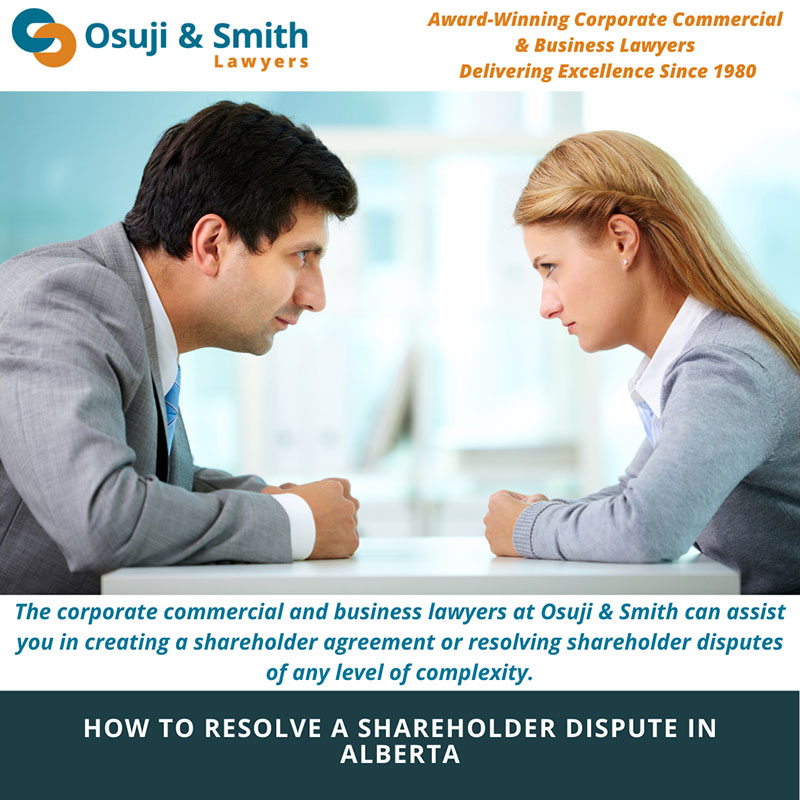How to Resolve a Shareholder Dispute in Alberta
A shareholder is any individual or institution with a financial interest in a private or public corporation by owning at least one share. Shareholders have various rights and responsibilities, which are outlined in the shareholder agreement. Sometimes the stakes are high, so shareholder disputes are common.
In this post, we’ll answer 4 common questions about shareholder disputes in Alberta:
- What is a shareholder dispute?
- What causes a shareholder dispute?
- How can I prevent a shareholder dispute?
- How do I resolve a shareholder dispute?
While shareholder disputes may seem complex, the basics of shareholder disputes in Alberta are simple. Let’s dive in.
What is a shareholder dispute?

A shareholder dispute is a disagreement among shareholders or between shareholders and the owners of the company.
Common examples of shareholder disputes include:
- Breach of shareholder agreement or other contracts
- Conflicts of interest or fiduciary misconduct
- Disagreement over management or direction
- Differences in compensation or contribution
- Alleged illegal or fraudulent activity
- Disrespect of minority shareholders
- Personal problems affecting the business
Because all shareholders have a financial interest in the company, shareholder disputes often generate higher tension and greater complexity than other types of business disagreements.
What causes a shareholder dispute?
Alberta’s Business Corporations Act and the Canada Business Corporations Act govern corporations in Alberta and require that corporations act as good corporate citizens by considering the best interests of their shareholders. Disputes arise when it seems shareholders or corporations are not in compliance with these Acts.
A few examples of shareholder disputes are listed above, but let’s look more closely at 5 of the most common causes.
- Breach of shareholder agreement: A breach of the shareholder agreement may include selling shares in violation of the agreement, such as to a competitor, or one shareholder attempting to terminate the agreement without the consent of the other shareholders.
- Conflicts of interest or fiduciary misconduct: Even if they’re not employed by the company, shareholders have fiduciary responsibilities. It’s especially important for majority shareholders to deal openly and honestly with minority shareholders. Withholding vital financial information often results in a shareholder dispute.
- Disagreement: Disagreements between shareholders and company owners about the direction or management of the business, employee termination, company spending, or crucial decisions or disruptions to the business are common.
- Differences in compensation or contribution: Employees who are shareholders should be compensated fairly. If family members are paid more than non-family members for no apparent reason other than the familial connection, for example, a dispute could arise. Shareholder contribution can be another area of contention, particularly if it seems one shareholder isn’t pulling their weight.
- Disrespect of minority shareholders: Minority shareholders have less—if any—say in the decision-making or management of the company than majority shareholders. If minority shareholders’ rights are not being protected, conflict will arise. Examples include family expenses being paid for with company money, withholding information from minority shareholders, or majority shareholders not receiving dividends.
How do I resolve a shareholder dispute?
When a shareholder dispute arises, the first step is to review the shareholder agreement. The shareholder agreement determines how a dispute may be resolved. It also details the rights and responsibilities of the shareholders, including policies or procedures about:
- Buying and selling shares
- Nominating and electing directors and management
- Receiving payment of dividends or assets remaining after liquidation
- Proposing and voting on shareholder resolutions
- Forcing a shareholder to sell their shares in certain circumstances
The shareholder rights outlined in the shareholder agreement should determine the method of resolution available. If a shareholder agreement doesn’t provide information to inform resolution measures, shareholders can—and should—revise or create such a shareholder agreement during the dispute and resolution process.
The best way to resolve a shareholder dispute is by mutual agreement. When all shareholders are willing to negotiate and agree, resolution is efficient and cost-effective.
There are other ways to resolve shareholder disputes in Alberta, including:
- Appoint a third party or engage a neutral professional mediator to resolve the dispute
- Appoint additional directors to bring fresh perspectives or avoid a deadlock
- Call a general meeting to consider dismissing a director
- Arrange a buyout or force the sale of shares
- Divide the company into separate entities
- Close or sell the business and distribute the proceeds to shareholders
A last resort is to file a lawsuit. The court may order meetings, investigations, dissolution orders, derivative actions, arbitration, appraisal remedies, or corrections or modifications to company actions.
No matter which method of dispute resolution you choose, consult an experienced business law attorney to review your shareholder agreement and inform you of your options and their effects.
How can I prevent a shareholder dispute?
Not all shareholder disputes are preventable, but the best way to avoid one is to have a carefully-crafted shareholder agreement in place from the beginning.
The corporate commercial and business lawyers at Osuji & Smith can assist you in creating a shareholder agreement or resolving shareholder disputes of any level of complexity. We strive to offer tactical and cost-effective solutions to our clients. Contact us today.

